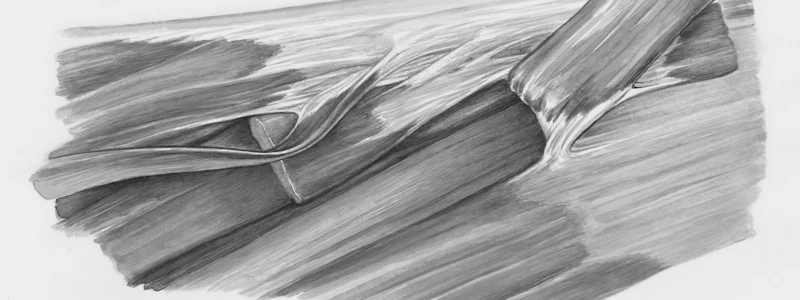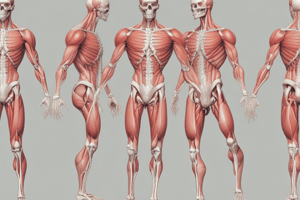Podcast
Questions and Answers
What type of muscle arrangement is characterized by fibers that run parallel to the length of the muscle?
What type of muscle arrangement is characterized by fibers that run parallel to the length of the muscle?
- Fusiform
- Pennate
- Straplike (correct)
- Circular
Which of the following terms describes the points where muscles originate and insert?
Which of the following terms describes the points where muscles originate and insert?
- Attachment and Pivot
- Actuation and Deactivation
- Origin and Insertion (correct)
- Base and Tip
Which type of muscle action would require a significant amount of downforce to lift a leg?
Which type of muscle action would require a significant amount of downforce to lift a leg?
- Isometric action
- Agonist action
- Eccentric action
- Concentric action (correct)
What term is used to describe muscles that work in opposition to each other during movement?
What term is used to describe muscles that work in opposition to each other during movement?
Which muscle arrangement is defined by having a feather-like structure with fibers arranged at angles?
Which muscle arrangement is defined by having a feather-like structure with fibers arranged at angles?
When discussing muscle composition, what type of muscle fibers are primarily designed for stamina and prolonged activities?
When discussing muscle composition, what type of muscle fibers are primarily designed for stamina and prolonged activities?
Which of the following best describes the mechanics of muscle actions?
Which of the following best describes the mechanics of muscle actions?
What is the significance of muscle layers in anatomy?
What is the significance of muscle layers in anatomy?
What is the primary role of muscles in relation to the skeletal system?
What is the primary role of muscles in relation to the skeletal system?
How many muscles are estimated to be present in humans and domestic mammals combined?
How many muscles are estimated to be present in humans and domestic mammals combined?
What specific movement functions do muscles support in humans?
What specific movement functions do muscles support in humans?
Which of the following best describes the arrangement of muscles in terms of function?
Which of the following best describes the arrangement of muscles in terms of function?
What is one specific example of fine movement produced by muscles?
What is one specific example of fine movement produced by muscles?
How many muscles are dedicated specifically to moving the eyeball?
How many muscles are dedicated specifically to moving the eyeball?
What anatomical feature supports the bewildering array of movements among animals?
What anatomical feature supports the bewildering array of movements among animals?
In general muscle anatomy, what is one aspect that is common across species, including quadrupeds and bipeds?
In general muscle anatomy, what is one aspect that is common across species, including quadrupeds and bipeds?
What classification includes fusiform and pennate types of muscle shapes?
What classification includes fusiform and pennate types of muscle shapes?
Which muscle type is described as feathered or pennate?
Which muscle type is described as feathered or pennate?
Which statement accurately describes the origin of a muscle?
Which statement accurately describes the origin of a muscle?
What characterizes the smallest muscles in the human body?
What characterizes the smallest muscles in the human body?
What term refers to the bundles that fibers are organized into within a muscle?
What term refers to the bundles that fibers are organized into within a muscle?
Which characteristic is NOT associated with straplike muscles?
Which characteristic is NOT associated with straplike muscles?
Which of the following is true regarding pennate muscles?
Which of the following is true regarding pennate muscles?
What distinguishes the mechanics of simple movements from complex movements in muscles?
What distinguishes the mechanics of simple movements from complex movements in muscles?
What does the term 'gluteus maximus' primarily describe?
What does the term 'gluteus maximus' primarily describe?
What characteristic do the names 'extensor pollicis longus' and 'extensor pollicis brevis' share?
What characteristic do the names 'extensor pollicis longus' and 'extensor pollicis brevis' share?
Which muscle name is derived from a Latin term describing a profession?
Which muscle name is derived from a Latin term describing a profession?
How are the muscles of the axial skeleton characterized?
How are the muscles of the axial skeleton characterized?
What role do group muscles play during bipedal walking?
What role do group muscles play during bipedal walking?
What aspect of muscle naming does 'vastus lateralis' highlight?
What aspect of muscle naming does 'vastus lateralis' highlight?
Which of the following statements about the names of muscles is correct?
Which of the following statements about the names of muscles is correct?
What does the term 'anatomical positioning' refer to in muscle names?
What does the term 'anatomical positioning' refer to in muscle names?
What role does the deltoid muscle play during a biceps brachii curl?
What role does the deltoid muscle play during a biceps brachii curl?
Which type of contraction occurs when a muscle actively shortens?
Which type of contraction occurs when a muscle actively shortens?
What is the primary reason muscles generate less force when they have oblique (feathered) fibers?
What is the primary reason muscles generate less force when they have oblique (feathered) fibers?
What limits the stretch of a muscle during movement?
What limits the stretch of a muscle during movement?
Which characteristic of muscles allows them to support actions without shortening?
Which characteristic of muscles allows them to support actions without shortening?
Why is the Latin nomenclature of muscles considered inconsistent?
Why is the Latin nomenclature of muscles considered inconsistent?
How do axial muscles support movement?
How do axial muscles support movement?
What role do tendons and fascia play when muscles are stretched?
What role do tendons and fascia play when muscles are stretched?
Which term describes a muscle that is shaped like a diamond?
Which term describes a muscle that is shaped like a diamond?
What is the meaning of the term 'Profundus' in muscle anatomy?
What is the meaning of the term 'Profundus' in muscle anatomy?
Which muscle name commonly indicates it has two heads?
Which muscle name commonly indicates it has two heads?
Which prefix indicates a muscle is located on the outer part of the body?
Which prefix indicates a muscle is located on the outer part of the body?
Which action would a muscle labeled as 'Extensor' primarily perform?
Which action would a muscle labeled as 'Extensor' primarily perform?
Which muscle name is associated with actions involving the abdomen?
Which muscle name is associated with actions involving the abdomen?
What characteristic does the term 'longus' denote in a muscle name?
What characteristic does the term 'longus' denote in a muscle name?
Which of the following is NOT a positional descriptor used in muscle nomenclature?
Which of the following is NOT a positional descriptor used in muscle nomenclature?
Flashcards
Functional Anatomy
Functional Anatomy
The study of how muscles work, their structure, and how they contribute to movement.
Muscles as Actuators
Muscles as Actuators
Muscles are the actuators of the body, meaning they create movement by contracting.
Muscle Naming
Muscle Naming
The way muscles are named (e.g., biceps, triceps) often reflects their shape, size, location, or function.
Muscle Anatomy Across Species
Muscle Anatomy Across Species
Signup and view all the flashcards
Muscle Layers and Groups
Muscle Layers and Groups
Signup and view all the flashcards
Filaments, Fibres, and Fascicles
Filaments, Fibres, and Fascicles
Signup and view all the flashcards
Muscle Shapes
Muscle Shapes
Signup and view all the flashcards
Muscle Sizes
Muscle Sizes
Signup and view all the flashcards
Musculoskeletal Physiology
Musculoskeletal Physiology
Signup and view all the flashcards
Muscles
Muscles
Signup and view all the flashcards
Interaction of frameworks and actuators
Interaction of frameworks and actuators
Signup and view all the flashcards
Functional anatomy of muscles
Functional anatomy of muscles
Signup and view all the flashcards
Muscle groups
Muscle groups
Signup and view all the flashcards
Muscle action
Muscle action
Signup and view all the flashcards
Muscle quantity
Muscle quantity
Signup and view all the flashcards
Muscle roles
Muscle roles
Signup and view all the flashcards
Muscle filament
Muscle filament
Signup and view all the flashcards
Muscle fibers
Muscle fibers
Signup and view all the flashcards
Muscle fasciculi
Muscle fasciculi
Signup and view all the flashcards
Straplike muscle
Straplike muscle
Signup and view all the flashcards
Fusiform muscle
Fusiform muscle
Signup and view all the flashcards
Pennate muscle
Pennate muscle
Signup and view all the flashcards
Muscle origin
Muscle origin
Signup and view all the flashcards
Muscle insertion
Muscle insertion
Signup and view all the flashcards
Muscle Naming Conventions
Muscle Naming Conventions
Signup and view all the flashcards
Muscle Names Indicate Action and Location
Muscle Names Indicate Action and Location
Signup and view all the flashcards
Muscles Named for Position and History
Muscles Named for Position and History
Signup and view all the flashcards
Axial Muscle Layers
Axial Muscle Layers
Signup and view all the flashcards
Muscles Work in Groups
Muscles Work in Groups
Signup and view all the flashcards
Agonist
Agonist
Signup and view all the flashcards
Antagonist
Antagonist
Signup and view all the flashcards
Fixator
Fixator
Signup and view all the flashcards
Synergist
Synergist
Signup and view all the flashcards
Eccentric Contraction
Eccentric Contraction
Signup and view all the flashcards
Concentric Contraction
Concentric Contraction
Signup and view all the flashcards
Muscle Heads/Bellies
Muscle Heads/Bellies
Signup and view all the flashcards
Muscle Depth
Muscle Depth
Signup and view all the flashcards
Muscle Attachment
Muscle Attachment
Signup and view all the flashcards
Muscle Position
Muscle Position
Signup and view all the flashcards
Muscle Location
Muscle Location
Signup and view all the flashcards
Study Notes
Musculoskeletal Physiology - Muscles
- Muscles are the largest mass of tissue in mammals, acting as actuators with passive spring-like qualities
- Muscle names are often derived from Latin and Greek, which can be inconsistent and obscure, but may offer clues about position, size, shape, and function
- Muscles are arranged in layers in the axial skeleton to support posture and movement.
- Muscles act in groups or individually to create complex movements
- Concentric contractions (isotonic) involve shortening muscles to lift loads, while tension remains constant
- Isometric contractions involve tension development when the load is too great, and the muscle doesn't shorten
- Muscles stretch passively, with tendons and connective tissue under tension during movement
- Muscle force is proportional to its cross-sectional area for parallel fibers
- Feathered muscles generate more force overall with oblique fibers but do so with shorter relative contraction compared to parallel fibers.
Muscle Anatomy
- Muscles are composed of filaments, fibers, and fascicles
- Fascicles can be straplike, fusiform (spindle-shaped), or pennate (feathered)
- Muscle sizes vary; large muscles like the gluteus maximus versus smaller ones like the lumbricals in the hand.
- Muscles may have multiple origins and insertions.
- Muscles are grouped by commonalities, such as position (anterior, posterior, medial, etc.) or depth (superficial or deep).
Muscle Function
- Muscles have an origin (fixed end) and an insertion (moving end)
- Muscles perform actions like extension, flexion, abduction, etc.
- Muscles may have different roles depending on the action, e.g., a muscle can act as a fixator or a synergist.
- Examples of muscle actions: deltoid as fixator in biceps curl or contralateral pelvic & leg muscles during the swing phase of walking
Studying That Suits You
Use AI to generate personalized quizzes and flashcards to suit your learning preferences.



